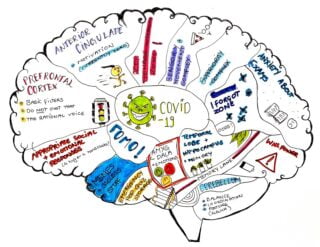COVID-19 pandemic has brought unprecedented challenges for individuals and communities worldwide. One of the major challenges people face during the pandemic is addiction. Addiction is a complex and chronic disease that affects millions of people globally. The pandemic has amplified the effects of addiction, making it harder for people to manage their addiction and seek help. In this article, we will provide insights on how to handle addiction during the pandemic and share tips and resources to manage addiction effectively.
Let’s dive in to How to Deal with Addiction
Understanding Addiction:
Addiction is a chronic and relapsing disease characterized by the compulsive and uncontrollable use of drugs, alcohol, or other substances despite harmful consequences. Addiction can also involve non-substance behaviors such as gambling, gaming, or shopping.
Addiction is caused by a combination of genetic, environmental, and social factors, including trauma, stress, mental health conditions, and family history.
Effects of the Pandemic on Addiction:
The pandemic has led to increased stress and anxiety levels, which can trigger and worsen addiction. Many people have also experienced isolation and loneliness due to social distancing measures and lockdowns, which can exacerbate addiction.
Furthermore, limited access to support groups and treatment facilities has made it challenging for people to manage their addiction and seek help.

Tips for Managing Addiction During the Pandemic:
Reach out for help:
Reach out to a healthcare professional or a trusted support group for help. Many support groups have moved their meetings online, making it easier to access help from home.
Create a routine:
Create a daily routine that includes healthy habits such as exercise, healthy eating, and regular sleep patterns. A routine can help create structure and stability, reducing stress and anxiety levels.
Engage in healthy activities
Find activities that you enjoy such as reading, music, or art, and engage in them regularly. Healthy activities can help reduce stress levels and provide a sense of purpose and fulfillment.
Avoid triggers:
Identify and avoid triggers that can lead to addiction such as specific people, situations, or emotions. Learn healthy coping mechanisms to manage triggers.
Practice self-care:
Take care of yourself physically, emotionally, and mentally. Practice self-compassion and self-care activities such as meditation, yoga, or deep breathing.
Resources for Addiction Support During the Pandemic:
There are various resources available for addiction support during the pandemic, including:
1) Online forums for support:
Many support groups such as Alcoholics Anonymous (AA) or Narcotics Anonymous (NA) have moved their meetings online, providing a safe and accessible way for people to connect with others who understand their struggles.
2) Teletherapy:
Many mental health professionals offer teletherapy, a form of therapy conducted over the phone or through video conferencing. Teletherapy provides a convenient and safe way to receive therapy from the comfort of your home.
3) Hotlines and helplines:
There are many hotlines and helplines available for people struggling with addiction. These services are staffed by trained professionals who can provide guidance, support, and resources for managing addiction during the pandemic.

Supporting a Loved One with Addiction:
Supporting a loved one with addiction can be challenging, especially during a pandemic. Here are some tips for supporting a loved one with addiction during the pandemic:
1) Communication and understanding:
Maintain open and honest communication with your loved one. Try to understand their struggles and offer support without judgment or criticism.
2) Encouraging healthy habits:
Encourage your loved one to engage in healthy habits such as exercise, healthy eating, and regular sleep patterns. These habits can help reduce stress and anxiety levels and improve overall well-being.
3) Setting boundaries:
Set boundaries that protect your own well-being and mental health. Be clear about what you are willing and able to do to support your loved one, and what you are not.
In conclusion
This pandemic has brought unique challenges for people struggling with addiction. However, many ways to manage addiction during the pandemic include seeking help, creating a routine, engaging in healthy activities, avoiding triggers, and practicing self-care.
Many resources are available for addiction support during the pandemic, including online support groups, teletherapy, hotlines, and helplines.
Supporting a loved one with addiction during the pandemic requires communication, understanding, and setting boundaries. With the right tools and support, managing addiction during the pandemic and achieving recovery is possible.
Helpful Resources
There are several reliable resources available for individuals who are struggling with addiction during the pandemic. Here are a few examples:
- National Institute on Drug Abuse (NIDA): NIDA is a government-funded research organization that provides information and resources on addiction and substance abuse. Their website offers resources specifically tailored to the pandemic, including information on telehealth and online support groups.
- Substance Abuse and Mental Health Services Administration (SAMHSA): SAMHSA is a government agency that provides information and resources on addiction and mental health. Their website offers resources specifically tailored to the pandemic, including a national helpline for individuals who are struggling with addiction or mental health issues.
- Alcoholics Anonymous (AA): AA is a support group for individuals struggling with alcohol addiction. AA has moved many of its meetings online, providing a safe and accessible way for individuals to connect with others who understand their struggles.
- Narcotics Anonymous (NA): NA is a support group for individuals struggling with drug addiction. Like AA, NA has moved many of its meetings online, providing a safe and accessible way for individuals to connect with others who understand their struggles.
- Mental health professionals: Mental health professionals such as therapists and counselors can provide individualized support and guidance for individuals struggling with addiction during the pandemic. Many mental health professionals offer teletherapy, a form of therapy conducted over the phone or through video conferencing.


